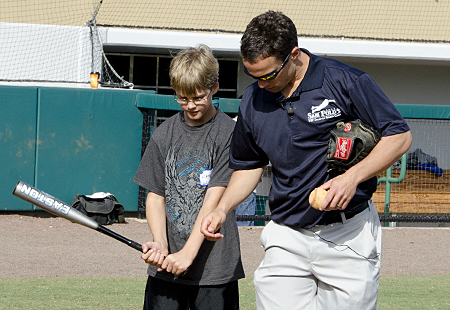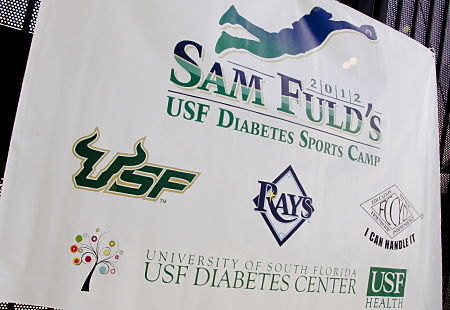Kids coached by athletes who share their daily challenges of living with type 1 diabetes
httpvh://www.youtube.com/watch?feature=player_embedded&v=BwglEmsO2-o
The kids who attended the first annual Sam Fuld USF Diabetes Center Sports Camp this weekend got more than a chance to catch fly balls, practice a tennis swing or hone hoop skills. Throughout the day the youngsters heard positive messages from the camp coaches, all of whom share their daily challenges of living with type 1 diabetes.
Perhaps none more reassuring than the one emphasized by the athlete who helped organize the camp, Tampa Bay Rays outfielder Sam Fuld.
“There used to be a stigma attached to having diabetes and being involved in competitive sports, but the medications and therapies available today (to help control blood sugar) are so much better,” said Fuld, who checks his blood sugar throughout the day, including two to three times during games, and gives himself several insulin shots daily. “There’s no reason for diabetes to hold you back in any shape or form.”
More than 100 campers, young athletes with type 1 diabetes invited to bring along a friend or sibling without diabetes, participated in several sports during the camp, which was held in the USF Athletic District.
Paige Tepper, 10, of Largo, selected baseball-softball, tennis and cheerleading as her sports sessions. Her brother Aidan, 9, who does not have diabetes, joined Paige in the morning for the baseball drills before heading for the soccer field and basketball court.
“I’m glad he came, because he looks out for me,” said Paige, who sported sneakers with pink shoelaces and, like many young campers, wore an insulin pump. “It’s good to have that support.”
Athletes, like Fuld and King, who have succeeded at high-level competition while managing their type 1 diabetes provide inspirational role models for the campers, whether they’re interested in sports competitively or for recreation and exercise, said Dr. Henry Rodriguez, medical director of the USF Diabetes Center.
“If these kids want to play baseball, or soccer, or basketball, we want to empower them to do that,” Dr. Rodriguez said. “Physical activity can help lower blood sugar and improve one’s sense of well being. While balancing activity and blood sugar control can be a challenge for athletes with type 1 diabetes, with proper management they can achieve just about everything.”
Dr. Rodriguez and the staff of the USF Diabetes Center provided medical supervision for the campers, supported by nurses from the Tampa Bay area and counselors from Florida Diabetes camps. Plenty of granola bars, peanut butter crackers and juice packs were on hand to help campers maintain normal glucose levels.

Dr. Henry Rodriguez (left), medical director of the USF Diabetes Center, says athletes like Fuld who successfully cope with diabetes and compete at a high level, are inspirational role models.
As each new group of campers arrived for the baseball drills, Fuld gathered them together in the dugout for an informal chat. The conversation ranged from his experiences growing up with diabetes to questions about playing professional baseball.
Does he ever get dizzy out on the field? Fortunately, he’s never had to come out of a game, Fuld said. “If my blood sugar feels low, I pop a few pieces of gum… As an emergency measure, if I need more, I always keep a granola or protein bar in my back pocket.”
How many bats does he have? “Plenty of extras” in case one breaks.
Fuld encouraged the campers not to be self-conscious about having type 1 diabetes. “I’ve never met anyone who didn’t like me because I was diabetic… so talk to your teammates about it.”

The USF Diabetes Center staff was on hand to provide assistance with blood draws or shots, if needed.
The genesis for the diabetes sports camp originated with Fuld’s tour last August of the newly opened USF Diabetes Center, where he met with young patients and learned about the facility’s family-centered programs and leading-edge research.
“The camp gives kids the chance to learn how to deal with being a diabetic athlete and to gain inspiration from peers and coaches,” Fuld said. “I’m excited about making it an annual tradition in the Tampa Bay area.”
Type 1 diabetes, most commonly diagnosed in children and young adults, occurs when the immune system destroys insulin-producing cells of the pancreas. People with type 1 diabetes produce no insulin and must use insulin injections daily to control their blood sugar.
For more information about the USF Diabetes Center, visit http://diabetes.health.usf.edu/
Story by Anne DeLotto Baier, video by Amy Mariani and photos by Eric Younghans, USF Health Communications.





